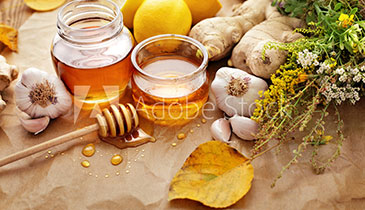 Source: Be Well
Source: Be Well
As winter approaches, many folks demand an antibiotic at first sneeze. Not only does this add to the epidemic of antibiotic-resistant superbugs, but antibiotics don’t kill viruses anyway — they kill bacterial infections, so taking them for viral ills like colds and flu is truly a waste, and a potentially life-threatening one at that.
Instead of popping pills, pop good food, herbs, and spices instead. Minimize the need for antibiotics by lacing your diet with foods that have naturally antibiotic properties. Doing so will not only boost overall health but will also help strengthen immunity, balance the good and bad bacteria in your gut, and give you a better shot at fighting off superbugs should they come knocking.
Here are a few of the delicious ones that are easy to work into your diet:
1. Extra-virgin Coconut Oil
A tasty antimicrobial and antifungal food, extra-virgin coconut oil (EVCO) contains the all-powerful lauric acid. The body converts lauric acid into monolaurin, which helps smack down certain types of viruses and pathogenic bacteria. Try adding EVCO to smoothies for antimicrobial effects and delicious tropical flavor. In addition, it’s also great for brain health, so dig in. To cook with EVCO, go with a moderate heat (up to the smoke point of about 350 degrees), and always buy organic and unprocessed versions to avoid chemical solvents, preservatives, and additives.
2. Garlic
Chopped, crushed or sliced, raw garlic is a powerful, pungent, and delicious medicinal food with known antiviral, antifungal and antibiotic properties that have helped mankind fend off flu and cold viruses for thousands of years. To get the best of what garlic has to offer, crush a few cloves and let them sit out for 10 to 15 minutes to aid the release of additional health-boosting chemical compounds.
3. Ginger
Fresh raw ginger is another good-for-you food that has an antibiotic effect on foodborne pathogens. While not a cure-all, some fresh ginger eaten before meals can offer an extra layer of protection from foodborne illnesses like salmonella and listeria. That can be a lifesaver, particularly when traveling and eating questionable or unusual foods, or dealing with indigestion.
4. Honey
Roman soldiers used to slather honey on battle wounds to prevent infection, and it’s thought to have been used as far back as the Stone Age as both a food and a medicine — it’s one sweet and delicious medicinal food that’s stood the test of time! Known for its ability to fight back against some 60 species of bacteria as well as various fungi and viruses, honey is also loaded with health-supportive antioxidants — just one more reason we’re sweet on the stuff. Just make sure it’s raw and don’t use too much!
5. Turmeric
Turmeric is the multi-tasking superhero of spices. This well-known anti-inflammatory has powerful anti-viral, anti-bacterial and anti-tumor properties. In short, turmeric fights for your health on multiple levels. Moreover, this tasty yellow spice boosts mitochondrial health, reducing the number of free radicals produced by aging or dying mitochondria. Not a fan of curries? Then add a curcumin supplement to boost benefits.
6. Fermented Foods
While not antibiotics per se, fermented foods deliver plenty of health-boosting protection to help make you more resilient and better able to repel viral and bacterial pathogens. When you eat fermented foods, you’re fortifying your gut with probiotics — good bacteria that boost the health of the belly, protecting it against the organisms that can make you sick. They help balance gut bacteria and stomach acids, release enzymes to ease and improve digestion, and make it easier for your body to extract and absorb more nutrients from the foods you eat.




